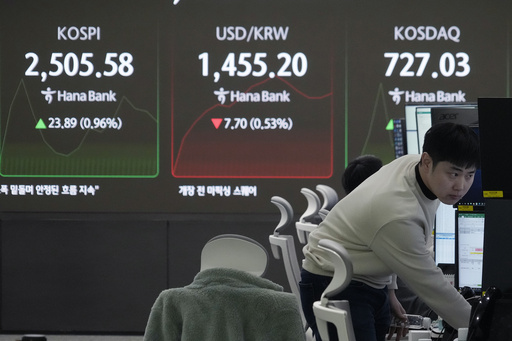
NEW YORK — On Wednesday, Wall Street exhibited a mixed performance as investors shifted their focus back to corporate profitability while momentarily diverting from the discussions surrounding President Trump’s tariffs.
The S&P 500 dipped by 0.1% in early trading, following varied trading results from European and Asian stock markets. As of 9:35 a.m. Eastern Time, the Dow Jones Industrial Average managed to gain 22 points, or 0.1%, while the Nasdaq composite saw a decline of 0.5%.
Shares of Alphabet saw a significant drop of 7.5% despite Google’s parent company exceeding profit estimates for the last quarter. Investors were more concerned about the slower growth of its cloud computing segment, which underperformed forecasts. The company’s budget of $75 billion for investments this year—approximately $15 billion over analysts’ expectations—was also scrutinized, as the company intensifies its efforts in artificial intelligence development.
Pressure is mounting on Alphabet from the financial community, with UBS analysts noting that “investors will be asking what new products will be emerging to warrant the higher level of investment.”
Advanced Micro Devices (AMD) faced an even steeper drop, tumbling 10.1%. Although the chip manufacturer surpassed profit expectations for the quarter, the company faced backlash for a less optimistic revenue forecast for the first three months of 2025, which estimated a 30% increase year-on-year but fell short of analysts’ expectations.
While experts deemed AMD’s results as strong, they questioned the lack of specifics regarding expectations for the company’s artificial intelligence products.
On a more positive note, toymaker Mattel limited the broader market declines, witnessing a surge of 13.5% after far exceeding profit expectations for the latest quarter.
Conversely, Disney Company experienced a turnaround, moving from an initial gain to a loss of 0.9% despite reporting stronger profits, aided by the success of the “Moana 2” feature.
Investors continue to demand larger profits from companies, a desire that may be amplified by the prevailing uncertainty in the global economy driven by Trump’s tariffs.
Following turbulence in financial markets earlier this week, concerns about a potential global trade war have begun to subside slightly after Trump granted 30-day extensions to both Mexico and Canada. This has led traders to speculate that Trump views tariffs primarily as negotiation tools rather than enduring policies.
Goldman Sachs economist David Mericle suggests that a further extension of the reprieve could be probable, but warns that tariff risks may linger until reviews of the United States’ trade agreement with Canada and Mexico are completed, anticipated around the middle of next year.
Meanwhile, Trump continues to proceed with tariffs on goods from China, and Mericle expects additional tariffs on products from the European Union among other possible actions. This could initiate a temporary spike in inflation, potentially raising a widely monitored inflation measure to 2.6% in December, surpassing the Federal Reserve’s 2% target.
One significant concern weighing on Wall Street is the potential that rising inflation could prevent the Federal Reserve from implementing further interest rate cuts this year. The Fed had initiated rate reductions in February to alleviate economic pressure and support the job market.
Bond market yields displayed a downward trend on Wednesday, with the 10-year Treasury yield decreasing to 4.44%, down from 4.52% at the end of Tuesday.
Internationally, European indexes showed a mixed performance amid relatively modest shifts. In Asia, the Hang Seng index in Hong Kong fell by 0.9%, while South Korea’s Kospi rose by 1.1%. Japan’s Nikkei 225 saw a slight increase of 0.1%, boosted by Honda Motor Co.’s stock climb after reports indicated that discussions regarding a joint holding company with Nissan were faltering; Nissan’s stock, however, fell by 4.9%.

